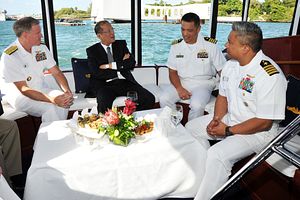Almost two years into Xi Jinping’s tenure at the helm of the Chinese political system, he had yet to meet his Filipino counterpart, Benigno Aquino III. His foreign minister, Wang Yi, who repeatedly got into heated exchanges with his Filipino counterpart, Albert Del Rosario, in various regional fora, had yet to make a single official visit to the Philippines more than a year into office.
The dearth of high-level dialogue between the two countries reflected the depth of bilateral animosities, especially after a dangerous standoff over the Scarborough Shoal in mid-2012, which perilously placed the two neighbors on the verge of an armed confrontation. But there was a whiff of new hope for revival in Philippine-China relations when Xi and Aquino managed to conduct an ‘icebreaker’ meeting on the sidelines of the Asia Pacific Economic Cooperation (APEC) summit in Beijing in late-2014.
In fact, Aquino was quite sentimental in describing his minutes-long encounter with Xi by claiming a ‘meeting of minds‘ with his Chinese counterpart. The confab marked the first face-to-face talk between the two heads of state. A closer look, however, reveals that the two neighbors will face an uphill battle in repairing their frayed ties.
China seems to be hardening its position in the South China Sea by ramping up its construction activities in disputed waters, frustrating efforts at negotiating a Code of Conduct (CoC) for maritime disputes in the region, and lambasting other claimant countries for fortifying their position on the ground.
The Dearth of Dialogue
While the Xi-Aquino meeting was a highly symbolic reflection of a shared desire to prevent a total breakdown in bilateral ties, one must not exaggerate the nature and implications of the encounter. To begin with, the meeting was not even a formal, pre-arranged dialogue.
There were no specific agreements on the agenda. The two leaders hardly even made any joint rhetorical pronouncement to, for instance, reaffirm their commitment to normalizing bilateral ties. This stood in stark contrast to Xi’s meeting with his Vietnamese and Japanese counterparts during the APEC summit.
Both Vietnam and Japan managed to renegotiate the parameters of their bilateral relations with China, discussing, among other things, the possibility of expanding existing crisis-management mechanisms to avoid accidental clashes and unwanted escalation in the high seas. Meanwhile, the Manila is yet to negotiate a single hotline with Beijing. In short, there were no concrete, tangible gains from the Xi-Aquino meeting.
With the Philippines hosting the 2015 APEC summit, both Xi Jinping and Wang Yi are set to make their first visit to Manila, potentially culminating in a formal dialogue between Aquino and Xi. The two countries could finally explore a new roadmap for de-escalating their maritime disputes and restoring a semblance of order and trust in their bilateral relations.
Yet, bilateral ties were once again tested when China officially boycotted the ongoing arbitration process in The Hague in the final weeks of 2014. China has fervently criticized Manila’s request for compulsory arbitration of the South China Sea disputes under the aegis of the United Nations Convention on the Law of the Sea (UNCLOS). Manila’s is set to submit additional legal arguments against China by late March
Back to Zero
Earlier this year, tensions over the Scarborough Shoal, which has been effectively cordoned off by Chinese para-military forces, were rekindled when Chinese Coast Guard forces allegedly rammed three Filipino fishing boats straddling close to the contested feature. Bilateral ties took a major hit when Filipino officials recently made a decision to effectively evict 18 Chinese experts, who have been working at the National Grid Corporation of the Philippines (NGCP). The Chinese technicians were working on behalf of the State Grid Corporation of China, which holds a 40% stake in the NGCP. Filipino officials have insinuated that the decision was partly shaped by national security-related concerns.
Manila has been particularly alarmed by the latest satellite imagery which reveals accelerated Chinese construction activities in the Spratly chain of islands, with the Fiery Cross Reef, for instance, having been artificially expanded to over 11 times its original size. Approximately 200 Chinese troops are said to be stationed in the strategic feature. A Chinese Air Defense Identification Zone in the South China Sea could just be around the corner.
Far from revisiting its assertive posturing in adjacent waters, China seems to have hardened its opposition to any ASEAN-brokered diplomatic compromise by deliberately blocking the discussion of a Code of Conduct (CoC) in the South China Sea. During the ASEAN Defence Senior Officials’ Meeting Plus, held in Kuala Lumpur, China opposed ASEAN members, who pushed for placing the CoC issue on the agenda of regional defense ministers’ meeting later this year.
In a recent press conference, the Chinese foreign minister angered his ASEAN counterparts by brazenly claiming that it was instead countries like Vietnam, Malaysia, and the Philippines, who were engaged “in illegal construction in another person’s [China’s] house.” He defended China’s sweeping constructing activities across the South China Sea by boldly asserting Beijing has “every right to do things that are lawful and justified.”
It is far from clear whether the ASEAN has enough resolve and diplomatic capital to bring China back to the negotiating table. What is clear is that Manila and Beijing have a long way to go before improving their troubled relations.
Richard Javad Heydarian is an assistant professor in political science at De La Salle University, and a policy adviser at the Philippine House of Representatives. He has authored more than 400 articles and policy papers on Asian geopolitical affairs, writing for or interviewed by Foreign Affairs, BBC, Bloomberg, Al Jazeera, New York Times, Wall Street Journal, The National Interest, The Nation, and NPR among others. He is the author of “The Philippines: The US, China and the Struggle for Asia’s Pivot State” (London, forthcoming).

































